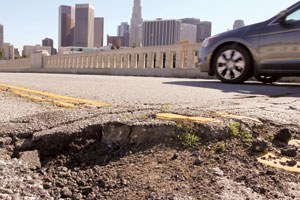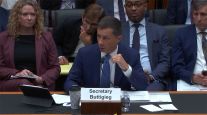Senior Reporter
Deficient Infrastructure, Congestion Cost California Motorists $53.6 Billion a Year

This story appears in the Sept. 5 print edition of Transport Topics.
Deficient roads and bridges and congested highways in California are costing the state’s motorists $53.6 billion a year and are increasing overall operating costs for trucking and shipping companies, according to a new report by a Washington D.C.-based transportation research group.
“The efficiency and condition of California’s transportation system, particularly its highways, are critical to the health of the state’s economy,” said the report released by nonprofit group The Road Information Program, or TRIP.
The California Transportation by the Numbers: Meeting the State’s Need for Safe, Smooth and Efficient Mobility report showed: “Annually, $2.8 trillion in goods are shipped to and from sites in California, mostly by truck. Sixty-eight percent of the goods shipped annually to and from sites in California are carried by trucks and another 19% are carried by courier services or multiple mode deliveries, which include trucking.”
Statewide, 37% of California’s major roads are in poor condition, the report said, adding that 42% are in mediocre or fair condition and the remaining 21% are in good condition.
Additionally, 25% of California bridges show significant deterioration or do not meet current design standards, 8% of the state’s bridges are structurally deficient and 17% are functionally obsolete, the TRIP report said.
“The TRIP report confirms what everyone in California knows: The transportation system in this state is in bad shape,” said Will Kempton, executive director of Transportation California. “It is past time for our elected officials in Sacramento to step up and deal with this problem.”
The condition of the state’s roads and bridges add significant costs to consumers, transportation companies, manufacturers, distributors and wholesalers. A poor condition also can reduce the attractiveness of a location when a company is considering expansion or where to locate a new facility.
“These conditions are only going to get worse if greater funding is not made available at the state and local levels,” said Will Wilkins, TRIP’s executive director. “Without adequate investment, California’s transportation system will become increasingly deteriorated and congested, hampering economic growth and the quality of life of the state’s residents.”
As California works to build and enhance a thriving, growing and dynamic state, it will be critical that it is able to address the state’s most significant transportation issues by providing a 21st century network of roads, highways, bridges and transit that can accommodate the mobility demands of a modern society, the report said.
“While the modest funding increase provided by the FAST Act will be helpful, numerous projects to improve the condition and expand the capacity of California’s roads, highways, bridges and transit systems will not be able to proceed without a substantial boost in state or local transportation funding,” the report said.
“If California is unable to complete needed transportation projects it will hamper the state’s ability to improve the condition and efficiency of its transportation system or enhance economic development opportunities and quality of life,” the report concluded.




